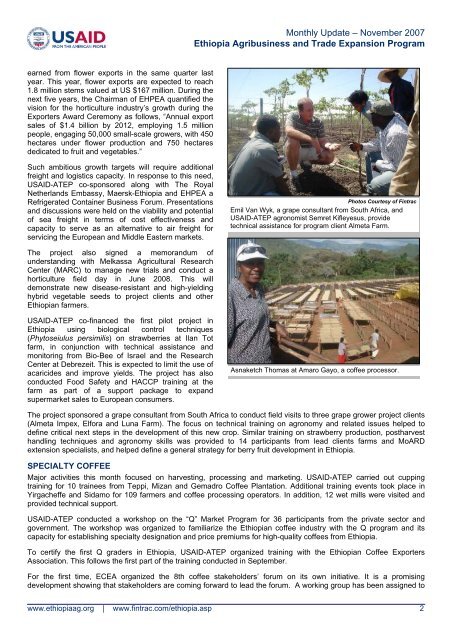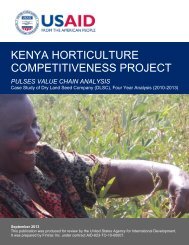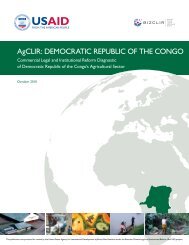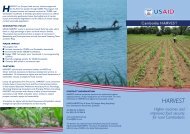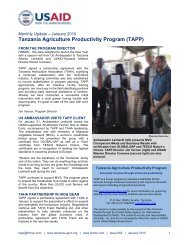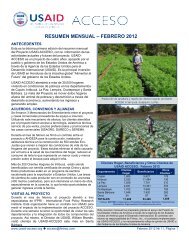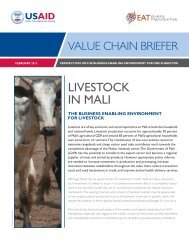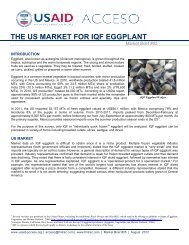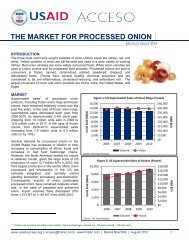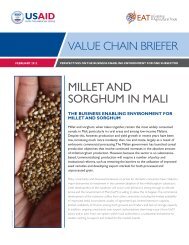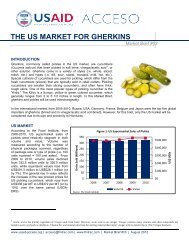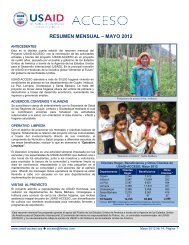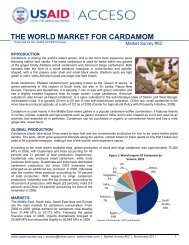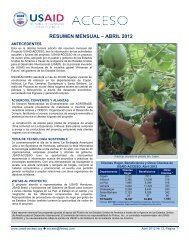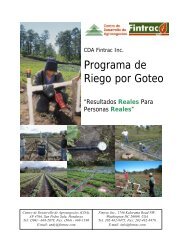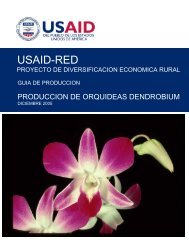NOTE FROM THE PROJECT DIRECTOR - Fintrac Inc.
NOTE FROM THE PROJECT DIRECTOR - Fintrac Inc.
NOTE FROM THE PROJECT DIRECTOR - Fintrac Inc.
You also want an ePaper? Increase the reach of your titles
YUMPU automatically turns print PDFs into web optimized ePapers that Google loves.
earned from flower exports in the same quarter last<br />
year. This year, flower exports are expected to reach<br />
1.8 million stems valued at US $167 million. During the<br />
next five years, the Chairman of EHPEA quantified the<br />
vision for the horticulture industry’s growth during the<br />
Exporters Award Ceremony as follows, “Annual export<br />
sales of $1.4 billion by 2012, employing 1.5 million<br />
people, engaging 50,000 small-scale growers, with 450<br />
hectares under flower production and 750 hectares<br />
dedicated to fruit and vegetables.”<br />
Such ambitious growth targets will require additional<br />
freight and logistics capacity. In response to this need,<br />
USAID-ATEP co-sponsored along with The Royal<br />
Netherlands Embassy, Maersk-Ethiopia and EHPEA a<br />
Refrigerated Container Business Forum. Presentations<br />
and discussions were held on the viability and potential<br />
of sea freight in terms of cost effectiveness and<br />
capacity to serve as an alternative to air freight for<br />
servicing the European and Middle Eastern markets.<br />
The project also signed a memorandum of<br />
understanding with Melkassa Agricultural Research<br />
Center (MARC) to manage new trials and conduct a<br />
horticulture field day in June 2008. This will<br />
demonstrate new disease-resistant and high-yielding<br />
hybrid vegetable seeds to project clients and other<br />
Ethiopian farmers.<br />
USAID-ATEP co-financed the first pilot project in<br />
Ethiopia using biological control techniques<br />
(Phytoseiulus persimilis) on strawberries at Ilan Tot<br />
farm, in conjunction with technical assistance and<br />
monitoring from Bio-Bee of Israel and the Research<br />
Center at Debrezeit. This is expected to limit the use of<br />
acaricides and improve yields. The project has also<br />
conducted Food Safety and HACCP training at the<br />
farm as part of a support package to expand<br />
supermarket sales to European consumers.<br />
Monthly Update – November 2007<br />
Ethiopia Agribusiness and Trade Expansion Program<br />
Photos Courtesy of <strong>Fintrac</strong><br />
Emil Van Wyk, a grape consultant from South Africa, and<br />
USAID-ATEP agronomist Semret Kifleyesus, provide<br />
technical assistance for program client Almeta Farm.<br />
Asnaketch Thomas at Amaro Gayo, a coffee processor.<br />
The project sponsored a grape consultant from South Africa to conduct field visits to three grape grower project clients<br />
(Almeta Impex, Elfora and Luna Farm). The focus on technical training on agronomy and related issues helped to<br />
define critical next steps in the development of this new crop. Similar training on strawberry production, postharvest<br />
handling techniques and agronomy skills was provided to 14 participants from lead clients farms and MoARD<br />
extension specialists, and helped define a general strategy for berry fruit development in Ethiopia.<br />
SPECIALTY COFFEE<br />
Major activities this month focused on harvesting, processing and marketing. USAID-ATEP carried out cupping<br />
training for 10 trainees from Teppi, Mizan and Gemadro Coffee Plantation. Additional training events took place in<br />
Yirgacheffe and Sidamo for 109 farmers and coffee processing operators. In addition, 12 wet mills were visited and<br />
provided technical support.<br />
USAID-ATEP conducted a workshop on the “Q” Market Program for 36 participants from the private sector and<br />
government. The workshop was organized to familiarize the Ethiopian coffee industry with the Q program and its<br />
capacity for establishing specialty designation and price premiums for high-quality coffees from Ethiopia.<br />
To certify the first Q graders in Ethiopia, USAID-ATEP organized training with the Ethiopian Coffee Exporters<br />
Association. This follows the first part of the training conducted in September.<br />
For the first time, ECEA organized the 8th coffee stakeholders’ forum on its own initiative. It is a promising<br />
development showing that stakeholders are coming forward to lead the forum. A working group has been assigned to<br />
www.ethiopiaag.org | www.fintrac.com/ethiopia.asp 2


